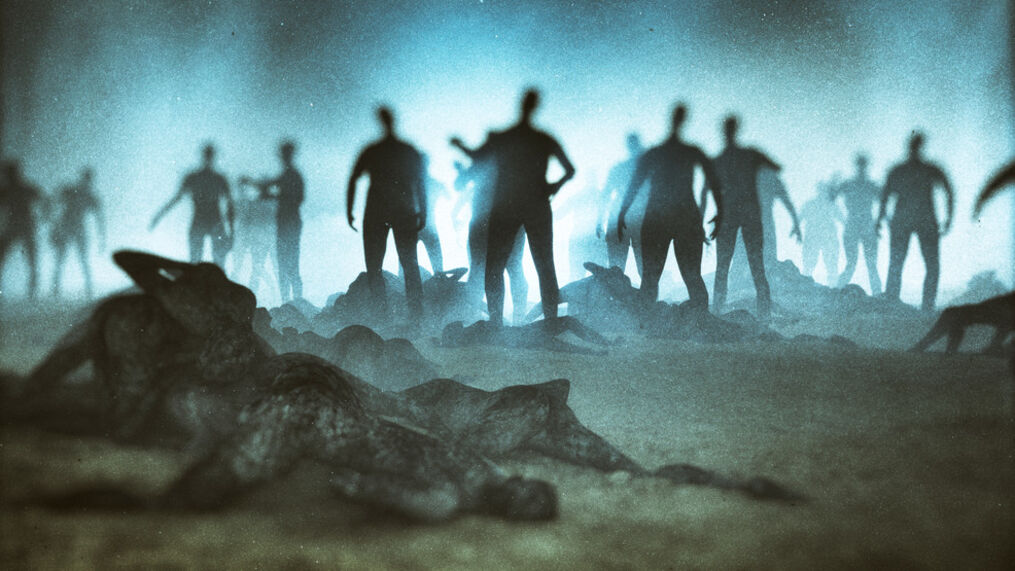
We live in the era of the Zombie Renaissance.
Zombies are everywhere, slouching or scrambling their way through feature films, TV series, Halloween bashes, and even a tongue-in-cheek CDC safety guide on how to survive a zombie apocalypse.
The classic zombie myth has Haitian roots. But the fear of being taken over by some kind of power or organism that transforms us into its willing slaves goes back to ancient times. Historians speculate that the fearful symptoms associated with rabies – infected persons usually succumbed to madness, despair, and death within a matter of days – probably contributed to the notion of “the walking dead.”
It’s creepy to ponder the fact that at any given moment every human being is home to a veritable metropolis of nonhuman organisms: bacteria, protozoa, and viruses that hijack our cells, our energy, and sometimes even what we eat for their own purposes.
These parasites have co-existed with humanity for a very long time. Some of them are capable of influencing our behavior, although none of them (so far) has been able to induce cannibalism – let alone an unyielding appetite for brains.
When we turn to the realm of animals, however, things get much more interesting.
Scientific American devoted an entire issue in 2017 to “The Real Zombies of Nature.” Biologists are well acquainted with a number of organisms that make their way through the world by taking over the lives of other creatures.
There’s “zombie ant fungus,” for instance. Ants that become infected with certain fungal spores are neurologically compelled to adopt a new behavior. They mindlessly climb up the stalks of plants to a specific height, at which point the spores drop from their bodies to the ground below. Studies have shown that that height just happens to be ideal for the reproduction of the fungus.
Then there’s histoplasmosis, a bacterium that takes up residence in the tissues of the organisms it infects. Histoplasmosis somehow reprograms mice to feel something that is definitely not in the best interests of the mice: They develop a strong attraction to cats. The cats eat the mice, after which the felines become living factories that produce and distribute more histoplasmosis.
When it comes to “Zombieland,” it’s clear that microbes can manipulate mammals.
There’s something inherently unsettling about being indwelt, taken over, or reshaped according to a will that overrides our own.
Does that mean we have reason to feel uneasy about opening ourselves to God’s Holy Spirit?
It’s worth pausing to consider the Spirit’s “location” during different biblical epochs. Prepositions tell the story. In the Old Testament (the time before Jesus), the Spirit falls upon prophets, priests, and kings. Those special anointings don’t last forever. And they seem to be distinct from a person’s character and integrity. The Spirit comes upon the strongman Samson, for instance, to help him beat the tar out of the Philistines. But there’s no evidence that Samson becomes wiser or better as a consequence.
In the New Testament (the post-Jesus period of spiritual history), the Holy Spirit dwells within men and women. This is directly related to one’s heartfelt surrender to Jesus, and has everything to do with the growth of Christ-like character.
Theologians use the word synergistic (from sun, “together,” and ergo, “work”) to describe this connection. Followers of Jesus and the Spirit work together to honor and serve God.
When we feel incapable of generating love, joy, patience, and kindness, the Spirit is quietly growing those very qualities within us (Galatians 5:22-23). When we feel overwhelmed by fear, the Spirit gives us confidence (2 Timothy 1:7). When we have no clue how to pray, the Spirit intercedes for us (Romans 8:26-27). When we think we can’t go on, the Spirit gives us strength (Ephesians 3:16). When we’re fresh out of hope, the Spirit of hope comes through (Romans 15:13). In each of these cases, the Spirit doesn’t reprogram our intentions against our will, but strengthens our ability to do what we have long desired to do.
People appropriately shudder at the notion of an invasive power taking over their bodies. That’s the stuff of horror movies.
But what if that power is working 24/7 from the inside-out to renew and reenergize their very souls? That’s the stuff of salvation.
Of course, we won’t know if that’s really true unless we find out for ourselves.
Ask God if you can find out this very weekend.
Generations of Christ-followers are convinced that God’s indwelling Spirit is no trick, but one of his most extraordinary treats.
